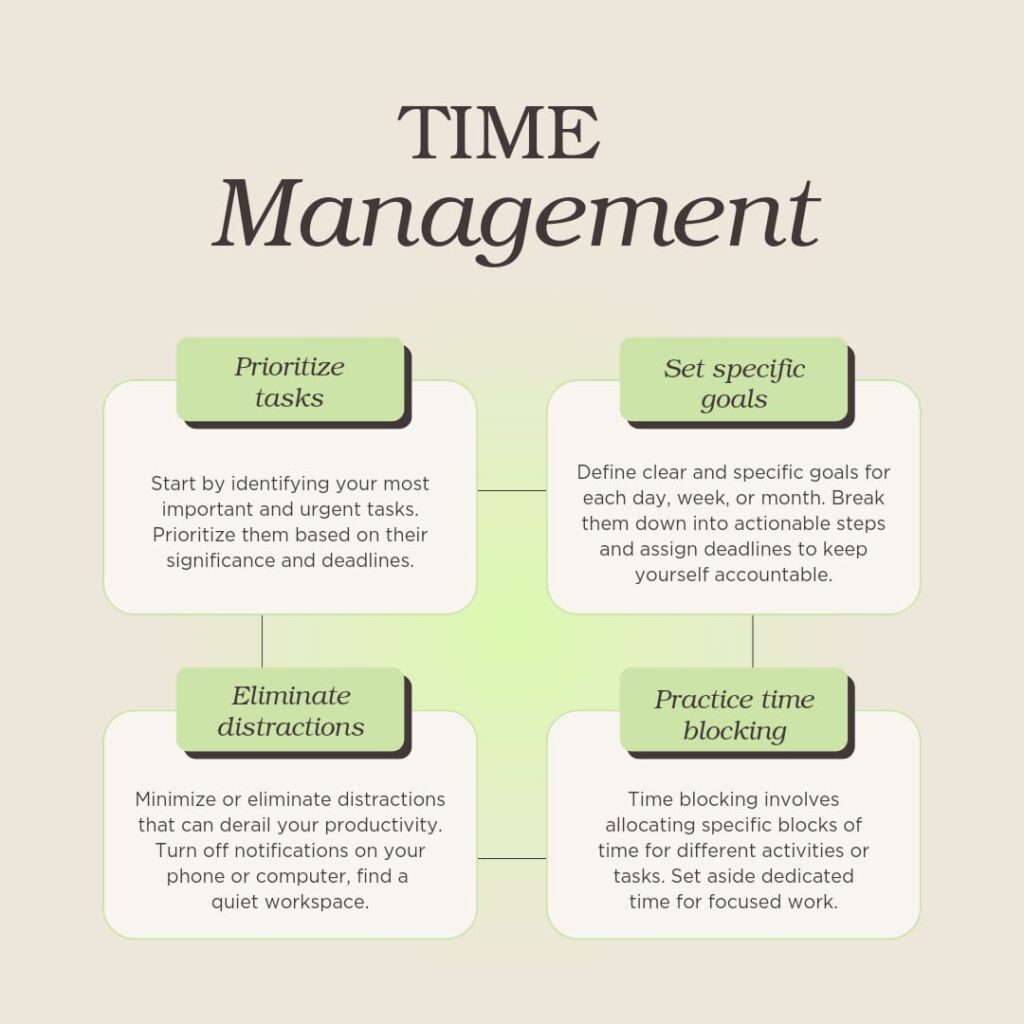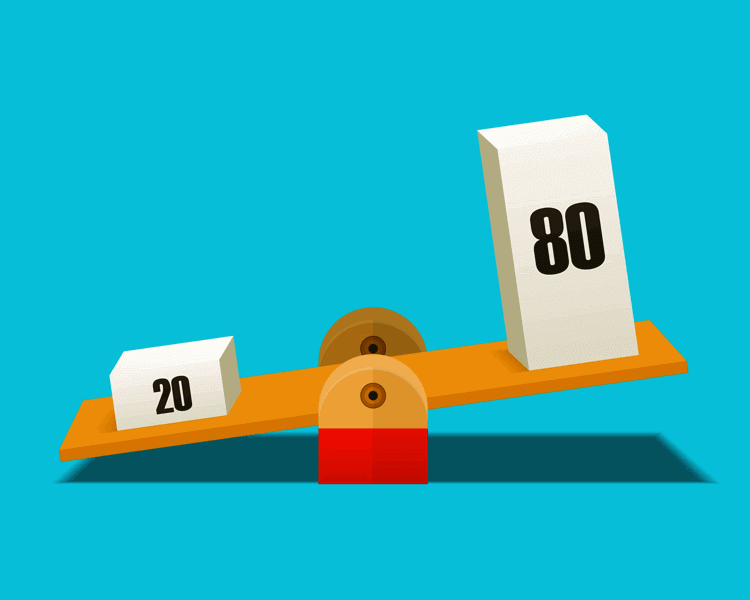Are you looking to up your time management and goal-setting game? We’re about to explore the ideal qualities of time management goals and how these can help you succeed personally and professionally.
You are well aware of why we need to master time management. It helps boost your productivity, reduce stress, and create a more balanced and fulfilling lifestyle.
So, without further adieu, let’s discuss the ideal qualities of time management goals!
What is Time Management?
Time management is the art of organizing your time in a way that helps you get things done effectively and efficiently. It involves planning and prioritizing your tasks so you can achieve your goals while maintaining a healthy balance in your life.
Think of it as a roadmap that guides you through your day, helping you complete your work and chores along with allowing you to enjoy your hobbies and properly relax without feeling overwhelmed.
At its core, time management is about making the most of your available hours. This means knowing what tasks need your immediate attention and what can wait.

It’s about setting achievable goals and breaking them down into manageable chunks, then using tools like calendars, to-do lists, and reminders to keep yourself on track.
When you manage your time well, you not only become more productive but also reduce stress and find yourself with more time for the things you enjoy.
Whether it’s spending quality time with loved ones, pursuing a hobby, or simply relaxing, effective time management allows you to live a fuller, more satisfying life.
Time management is not about managing tasks on time but creating a lifestyle we aspire to enjoy.
Qualities of Time Management Goals
Listed below are some of the most prominent qualities of effective time management goals. Lets have a look at them one by one.
Clarity
Clarity is about ensuring your goals are well-defined and easy to understand. Instead of vague aspirations like “get organized” or “improve productivity,” set clear goals such as “organize my workspace for 30 minutes every evening” or “complete my top three tasks before lunch.”
Importance of Clarity:
Clear goals help you stay focused and on track. When you know exactly what you’re aiming for, you’re more likely to take meaningful steps toward achieving it.
Examples
“Write 500 words for my novel each morning” or “Plan my weekly meals every Sunday evening.” These clear, specific goals make it easier to measure your progress and stay motivated.
Specificity
When your goals are specific, you can easily map out the steps needed to achieve them. It also helps you prioritize your tasks and avoid distractions.
Significance of Specificity:
Specific goals provide direction and purpose. For example, instead of “exercise more,” you could aim for “go for a 30-minute run every other day.”
Techniques:
Break down your larger goals into smaller, manageable tasks. This way, you can focus on one specific thing at a time and steadily work towards your objective.
Measurability
Measurable goals let you track your progress and celebrate small victories along the way, making it easier to stay motivated and committed.
Benefits of Measurable Goals:
Knowing how close you are to achieving your goals can keep you motivated and boost your confidence.
Tools and Methods:
Consider using apps or tools to track your progress, such as a calendar, task management app, or journal. Recording your achievements helps you stay on top of your goals and adjust your approach if necessary.
Achievability
Goals should be challenging yet attainable. If your goals are too easy, you won’t push yourself enough; if they’re too difficult, you risk becoming discouraged.
Defining Achievable Goals:
Set goals that stretch your abilities but are still within reach. This will keep you motivated and engaged without making you feel overwhelmed.
Strategies:
Break down larger goals into smaller, achievable tasks. This approach makes the process more manageable and helps you stay on track.
Relevance
Relevant goals align with your overall objectives and priorities. When your goals are meaningful to you, you’ll be more invested in achieving them.
Exploring Relevant Goals:
Ask yourself how each goal fits into your larger plans. Does it support your long-term objectives, or is it just a distraction?
Aligning Goals:
Ensure your goals complement one another and contribute to your overall success. This creates a harmonious, focused approach to your time management efforts.
Time-bound
Ensure your goals complement one another and contribute to your overall success. This creates a harmonious, focused approach to your time management efforts.
Time-bound goals have a clear deadline, which helps create a sense of urgency and accountability.
Understanding Time-bound Goals:
Deadlines keep you on track and provide a target to work towards. This can help you avoid procrastination and stay motivated.
Tips for Setting Realistic Deadlines:
Consider the complexity of the task and your other commitments when setting deadlines. Make sure they are challenging yet achievable.
Flexibility
Flexibility is an essential quality of time management goals. While setting structured plans is important, leaving room for adjustments when unexpected changes or challenges arise is equally vital. By being flexible, you can adapt your schedule as needed and avoid the stress of rigid planning.
Benefits of Flexibility:
Incorporating flexibility in your goals means being open to rearranging tasks when necessary. This kind of adaptability helps you stay on track and ensures that you’re making the most of your time.
Mindset and Improvement:
Being flexible also fosters a growth mindset and encourages learning from experiences. As a result, you can continuously improve your time management strategies and achieve greater efficiency.
Review and Adjustment
Reviewing your goals helps you assess your progress and make any necessary adjustments.
By checking in on your goals regularly, you can identify areas for improvement and celebrate your successes.
Keep a journal or use a tracking app to monitor your achievements. Reflect on your weekly or monthly goals to see what’s working and what needs tweaking.
Conclusion
We discussed the ideal qualities of time management goals in detail. We hope the next time your friend or colleague discusses the topic, you will be well-prepared to describe the ideal qualities of time management goals.
Time management can be a game-changer when it comes to achieving your goals and finding balance in your life. By focusing on the ideal qualities of time management goals—clarity, specificity, measurability, achievability, relevance, and time-bound objectives—you can set yourself up for success.
Remember, the key is to consistently review and adjust your goals as needed. By doing so, you’ll continue to refine your approach and become more efficient in your time management efforts. So go ahead, put these qualities into practice, and watch how they transform your ability to manage time effectively and achieve your goals!


